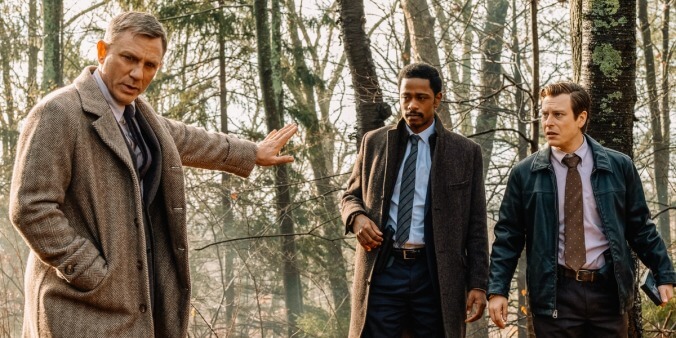Spoilerphobia is, generally speaking, a little out of control these days—if you’re angry to discover in advance something that happens, say, in the opening 10 minutes of a movie, you clearly got lost on your way to the sensory deprivation chamber and stumbled into a review by mistake. But I am sympathetic to the belief that not all the plot of a film should be disclosed by critics, no matter the rationale. And that goes double, perhaps, when writing about films at festivals, often weeks or even months before the general public will get a first gander at them. It’s why I didn’t take any offense, as some critics did, to both Quentin Tarantino and Bong Joon-ho imploring the press not to spoil some of the bigger reveals in their new movies when they premiered at Cannes. Spoilerphobia may be real, but there’s an opposite end of that spectrum, too.
Last night, a beaming Rian Johnson literally ran across the stage of the Princess Of Wales Theatre—a physical demonstration of the energy and enthusiasm he funnels into his work—to make a similar request of the audience that had gathered for the world premiere of his new movie. The film is a mystery, he argued. Please keep the ending to yourself. If anything, he was being too trusting, not cautionary enough. Knives Out (Grade: A-), an ingenious sleight-of-hand crowdpleaser, doesn’t just build to a whopper of an ending, as all Agatha Christie riffs must. It stacks surprises on top of surprises, springing them so early and often that responsibly writing about the film becomes an exercise in obfuscation itself, turning critics into guilty parties with secrets to conceal, like Leopold and Loeb dancing around that dead body in Rope. I will proceed with caution, and keep the twists and turns under lock and key.
Johnson, of course, has dabbled in detective fiction before—he jumpstarted his career with the nifty suburban noir of Brick. But Knives Out is a more specific and confident homage—what he accurately described, by way of introduction, as an old-school whodunit with a cast of movie stars, faithful to the spirit of its chosen genre even as it has diabolical fun complicating and compounding its conventions. The setup is classic Christie. A rich and famous mystery writer (Christopher Plummer) is found dead in his room, throat slit in an apparent suicide, on the night of his 85th birthday. A detective (LaKeith Stanfield), a state trooper (Noah Segan), and a deliciously Southern private eye (Daniel Craig, with what one character accurately describes as a Foghorn Leghorn accent) soon enter the author’s Gothic Massachusetts estate to interview the surviving family members. The private eye, in particular, doesn’t buy that the old man offed himself. And he’s got a whole accusing parlor of conniving, squabbling, moneyed relatives to question, each with their own special motives.
In a remarkable, hilarious, crosscutting interrogation set-piece, Johnson introduces these suspects, including ungrateful scion siblings (Michael Shannon and Jamie Lee Curtis), a performatively “compassionate” daughter-in-law (Toni Collette), the deceased’s quiet nurse (Ana de Armas), an alt-right shit-poster grandchild (It’s Jaeden Martell), and on and on. He also lays out the architecture of the house, the timeline of the party that happened the night before, the family history—whole pages of exposition, brilliantly masked by the screwball zing of his editing and dialogue. All this groundwork laid, the audience is primed to settle into the mechanics of the mystery. But as quickly as Johnson has set up his board, he scatters the pieces, dropping a reveal that seems to upend the whole game just as we’ve learned its rules. It’s a trick he’ll pull again and again in Knives Out, which keeps reinventing itself on the fly. This is the subversive, audience-confounding streak that earned Johnson’s last movie, a certain divisive space opera, the ire of the overly protective franchise faithful. Here, he rearranges the moving parts of the prototypical whodunit, not so much denying us its pleasures as shuffling them around to obscure what Craig’s flamboyant gumshoe calls the “arc” of the case.
This, in other words, is one of those mysteries so clever and fiendishly well-engineered that you eventually have no choice but to stop trying to get ahead of it, to simply enjoy the way it plants and payoffs. (One of the film’s more inspired devices is the habit one crucial character has of vomiting after lying—a tic both the movie and the detective milks for all it’s worth.) If it seems as though I’m being vague, that’s in compliance with Johnson’s reasonable plea; this is a movie whose fun is in the unfurling of its complex plot, so I wouldn’t dream of doing that for anyone here, at least not so far removed from the November release date. But know that Knives Out isn’t just deviously intelligent but also consistently gut-busting, and an impeccably crafted blast of Hollywood entertainment, built around several exceptional (and juicily venomous) performances. It also turns out to be as timely as it timeless, nestling a surprisingly pointed story of class conflict at the center of the investigation, championing decency in the face of selfishness and blinkered privilege. That’s a payoff, so moving in its relevance, that simply couldn’t be spoiled, even by a critic careless enough to spill plot points like admissible evidence.
